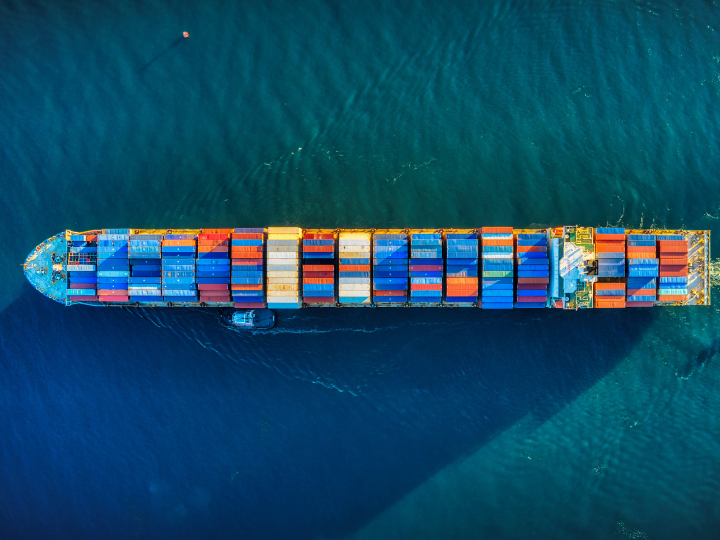by Sean Goulding Carroll
The European Parliament and EU ministers struck a deal in the early hours of Thursday morning (23 March) on the bloc’s flagship law to cut emissions in the maritime sector, marking a major step forward for the bloc’s plans to reach carbon neutrality by 2050.
Under the law, which is being hailed as the most ambitious maritime fuel legislation in the world, ship emissions will be reduced by 2% as of 2025 and 80% as of 2050.
Unlike its aviation counterpart, the law does not specify which fuels must be used in shipping but rather demands that the greenhouse gas intensity of fuels is lowered over time.
The level of greenhouse gas savings that must be achieved increases every five years: 2% as of 2025, 6% as of 2030, 14.5% as of 2035, 31% as of 2040, 62% as of 2045 and 80% as of 2050.
In addition to carbon, the targets cover methane and nitrous oxide emissions.
To the disappointment of the Greens, the agreement will apply only to ships above 5,000 tonnes. However, proponents point out that this covers some 90% of CO2 emissions from shipping.
The European Commission will review this in 2028, and will decide whether to place carbon-cutting requirements on smaller ships.
“This agreement sets out by far the world’s most ambitious path to maritime decarbonisation. No other global power has drafted such a comprehensive framework to tackle maritime emissions. This is truly ground-breaking,” said the European Parliament’s chief negotiator Jorgen Warborn, a Swedish lawmaker with the centre-right EPP group.
Warborn touted the decision to have the regulation apply to all ships operating in Europe, saying, “European citizens and companies should not foot the bill for the entire world’s climate efforts.”
“Climate change is a global problem and shipping is a global industry, but when progress is too slow in the international arena, the EU steps up and moves ahead,” he added.
Containerships and passenger ships docking at major EU ports, those covered by the EU’s alternative fuels infrastructure regulation, will also be required to plug into the on-shore power supply as of 2030, improving air quality by preventing the burning of fuel.
Under the agreement, penalties collected from those that fail to meet the targets will be allocated to projects focused on decarbonising the maritime sector.
The European Commission will also be tasked with monitoring the implementation of the regulation, ensuring it does not inordinately erode the sector’s competitiveness.
Maritime activities in the EU are responsible for around 3-4% of the bloc’s CO2 emissions yearly.
Last night’s deal represents an informal agreement between the bloc’s co-legislators, the European Parliament and Council. The deal will now need to be formally agreed upon by both institutions before becoming law.
If it is rejected by either, negotiations will need to reopen – an uncommon though not unprecedented occurrence.
Synthetic fuels
While low-carbon fuels such as second-generation biofuels and hydrogen-derived synthetic fuels, are currently much less available than oil, the legislation will significantly boost the market for sustainable maritime fuels, according to lawmakers.
The mandatory targets will increase demand for green fuels across the industry, spurring production and making such fuels cheaper over time.
Under the law, at least 2% of the bloc’s shipping fuels must consist of e-fuels made with green electricity by 2034.
To ensure that the e-fuel requirements remain affordable for the sector, an incentive regime is foreseen, allowing synthetic fuels to be double counted towards targets (known as a “multiplier of two”) until 2035.
Anne H. Steffensen, CEO of trade association Danish Shipping, welcomed the e-fuels incentive, saying that the multiplier is crucial to incentivising the uptake of a fuel that is currently “far from available in sufficient quantities”.
Jim Corbett, the European environmental director for the World Shipping Council, praised the legislation for helping to drive demand for low-carbon fuels in Europe. The agreement provides shipping companies with the needed clarity to “make further investments to support the transition to zero GHG [greenhouse gas] fuels”, he said.
The advanced biofuels industry was similarly positive towards the deal, with Angel Alvarez Alberdi, secretary general of the European Waste-based & Advanced Biofuels Association (EWABA), saying that the industry is ready to “significantly increase deliveries to the shipping sector to achieve the new ambitious EU maritime decarbonisation objectives”.
‘Swiss cheese’
However, not all lawmakers were quick to praise the agreement. Greens MEP Jutta Paulus, shadow rapporteur for the file, said the agreement falls short from a climate policy perspective.
“Instead of making Europe a leader in the research and development of sustainable fuels and marine propulsion, the EU limits itself to microscopic quotas for the 2020s and provides no incentives for additional investments in sustainable synthetic fuels,” said Paulus.
“Moreover, the new regulation for sustainable fuels in maritime transport resembles a Swiss cheese due to numerous exceptions. It remains to be hoped that the requirements of the regulation will be overtaken by reality, because ambitious shipping companies are already waiting in the wings,” she added.
*first published in: Euractiv.com




 By: N. Peter Kramer
By: N. Peter Kramer
